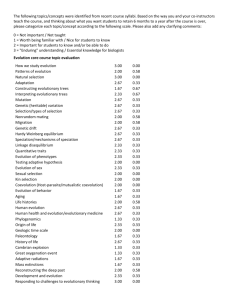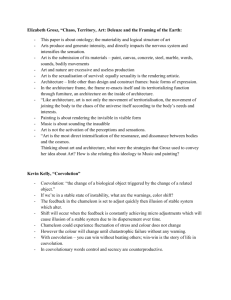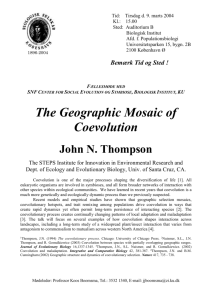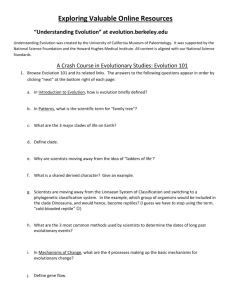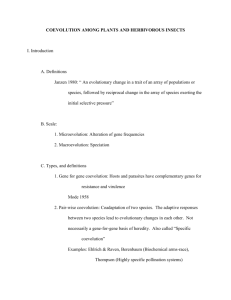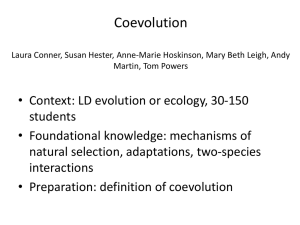Introduction to Coevolution - George Mason University Department
advertisement
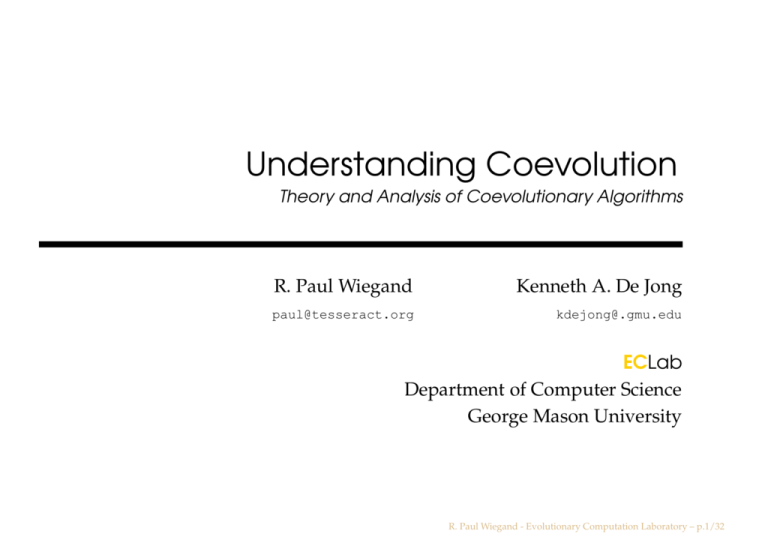
Understanding Coevolution Theory and Analysis of Coevolutionary Algorithms R. Paul Wiegand Kenneth A. De Jong paul@tesseract.org kdejong@.gmu.edu ECLab Department of Computer Science George Mason University R. Paul Wiegand - Evolutionary Computation Laboratory – p.1/32 Understanding Coevolution Workshop Schedule Introductory Discussion [2:00pm - 2:45pm] Paper Presentations (part I) [2:45pm - 3:45pm] Introduction to Coevolution Where we are & Where we are headed Survey of CEA Analysis Introduction to Workshop Papers Order-Theoretic Analysis of Coevolution Problems When Coevolutionary Algorithms Exhibit Evolutionary Dynamics Break [3:45pm - 4:00pm] R. Paul Wiegand - Evolutionary Computation Laboratory – p.2/32 Understanding Coevolution Workshop Schedule (cont’) Paper Presentations (part II) [4:00pm - 5:00pm] Panel Discussion [5:00pm - 6:00pm] The Dominance Tournament Method of Monitoring Progress in Coevolution Coevolutionary Construction of Features for Transformation of Representation in Machine Learning Introductory Remarks Open Discussion R. Paul Wiegand - Evolutionary Computation Laboratory – p.3/32 Workshop Schedule Introductory Discussion Introduction to Coevolution Where we are & Where we are headed Survey of CEA Analysis Introduction to Workshop Papers R. Paul Wiegand - Evolutionary Computation Laboratory – p.4/32 Introduction to Coevolution What is Coevolution? In Biology In Evolutionary Computation (EC) Simulation Problem Solving R. Paul Wiegand - Evolutionary Computation Laboratory – p.5/32 Introduction to Coevolution What is Coevolution? In Biology In Evolutionary Computation (EC) Simulation Problem Solving Key Idea: Individuals interact in some way to obtain fitness R. Paul Wiegand - Evolutionary Computation Laboratory – p.5/32 Introduction to Coevolution What are Coevolutionary Algorithms? Coevolutionary Algorithms (CEAs) Algorithms which implement coevolution (in the EC sense) Extensions to Evolutionary Algorithms R. Paul Wiegand - Evolutionary Computation Laboratory – p.6/32 Introduction to Coevolution What are Coevolutionary Algorithms? Coevolutionary Algorithms (CEAs) Algorithms which implement coevolution (in the EC sense) Extensions to Evolutionary Algorithms Key Differences: Subjective Fitness versus Objective fitness R. Paul Wiegand - Evolutionary Computation Laboratory – p.6/32 Introduction to Coevolution Properties of Coevolutionary Algorithms Mechanisms for subjective fitness assessment Population Structure R. Paul Wiegand - Evolutionary Computation Laboratory – p.7/32 Introduction to Coevolution Properties of Coevolutionary Algorithms Mechanisms for subjective fitness assessment Character of Interaction Cooperative Competitive Complex Methods of Interaction Implicit interaction (e.g., fitness sharing) Explicit interaction (how & how many, etc.?) Population Structure R. Paul Wiegand - Evolutionary Computation Laboratory – p.7/32 Introduction to Coevolution Properties of Coevolutionary Algorithms Mechanisms for subjective fitness assessment Character of Interaction Cooperative Competitive Complex Methods of Interaction Implicit interaction (e.g., fitness sharing) Explicit interaction (how & how many, etc.?) Population Structure Single population models Multiple population models Spatial models R. Paul Wiegand - Evolutionary Computation Laboratory – p.7/32 Introduction to Coevolution Advantages to CEAs Useful when there is no obvious objective measure Useful for problem decomposition Has the potential for open-endedness R. Paul Wiegand - Evolutionary Computation Laboratory – p.8/32 Introduction to Coevolution Disadvantages to CEAs Complicated & Counter-intuitive dynamics Not much theoretical guidance Optimization potential is unclear R. Paul Wiegand - Evolutionary Computation Laboratory – p.9/32 Workshop Schedule Introductory Discussion Introduction to Coevolution Where we are & Where we are headed Survey of CEA Analysis Introduction to Workshop Papers R. Paul Wiegand - Evolutionary Computation Laboratory – p.10/32 Where We are & Where We are Headed Summary of the 2001 Workshop Basic Concepts of Coevolution (Hugues Juillé & Rik Belew) High-level overviews Coevolution & ”Adaptive fitness” When coevolution should be used Example applications in coevolution R. Paul Wiegand - Evolutionary Computation Laboratory – p.11/32 Where We are & Where We are Headed Summary of the 2001 Workshop Basic Concepts of Coevolution (Hugues Juillé & Rik Belew) High-level overviews Coevolution & ”Adaptive fitness” When coevolution should be used Example applications in coevolution Central issues in Coevolution: How can CEA mechanisms for fitness assessment guarantee continuous progress with respect to an absolute performance measure? Evolutionary versus coevolutionary search R. Paul Wiegand - Evolutionary Computation Laboratory – p.11/32 Where We are & Where We are Headed Summary of the 2001 Workshop (cont’) 2001 Workshop Discussion Topics Evolutionary versus coevolutionary search Challenges of coevolution Techniques & architectures for implementation Theoretical frameworks of coevolution Open-endedness Next steps for coevolution community R. Paul Wiegand - Evolutionary Computation Laboratory – p.12/32 Where We are & Where We are Headed Motivation for this Year’s Workshop Last year we . . . Spent most time discussing Challenges of Coevolution Spent a little time talking about Theory Spent very little time identifying Next Steps R. Paul Wiegand - Evolutionary Computation Laboratory – p.13/32 Where We are & Where We are Headed Motivation for this Year’s Workshop Last year we . . . Spent most time discussing Challenges of Coevolution Spent a little time talking about Theory Spent very little time identifying Next Steps There seems to be a clear need for . . . Theory & analysis of coevolution Continued dialog among coevolutionary computation researchers R. Paul Wiegand - Evolutionary Computation Laboratory – p.13/32 Where We are & Where We are Headed Goals for this Year’s Workshop Promote theory and analysis of CEAs Foster discussion about state of the art research in Coevolution Identify next steps R. Paul Wiegand - Evolutionary Computation Laboratory – p.14/32 Where We are & Where We are Headed Questions for CEA Analysis How do CEAs work? How do we predict, characterize, and identify observed dynamics in coevolutionary systems? What are they good for & how should they be used? Do CEAs Optimize? R. Paul Wiegand - Evolutionary Computation Laboratory – p.15/32 Where We are & Where We are Headed Questions for CEA Analysis How do CEAs work? How do we predict, characterize, and identify observed dynamics in coevolutionary systems? What are they good for & how should they be used? Do CEAs Optimize? If ”yes”, then what do they optimize? R. Paul Wiegand - Evolutionary Computation Laboratory – p.15/32 Workshop Schedule Introductory Discussion Introduction to Coevolution Where we are & Where we are headed Survey of CEA Analysis Introduction to Workshop Papers R. Paul Wiegand - Evolutionary Computation Laboratory – p.16/32 Survey of CEA Analysis Categories of Analysis Component Analysis Performance & Problem Measures Convergence/Asymptotic Analysis R. Paul Wiegand - Evolutionary Computation Laboratory – p.17/32 Survey of CEA Analysis Categories of Analysis Component Analysis Methods of interaction Population structure Genetic operators Performance & Problem Measures Convergence/Asymptotic Analysis R. Paul Wiegand - Evolutionary Computation Laboratory – p.17/32 Survey of CEA Analysis Categories of Analysis Component Analysis Methods of interaction Population structure Genetic operators Performance & Problem Measures Identifying / Tracking CEA behaviors Incorporating measures for improved search Problem analysis Convergence/Asymptotic Analysis R. Paul Wiegand - Evolutionary Computation Laboratory – p.17/32 Survey of CEA Analysis Categories of Analysis Component Analysis Methods of interaction Population structure Genetic operators Performance & Problem Measures Identifying / Tracking CEA behaviors Incorporating measures for improved search Problem analysis Convergence/Asymptotic Analysis PAC Analysis Evolutionary Game Theory (EGT) R. Paul Wiegand - Evolutionary Computation Laboratory – p.17/32 Survey of CEA Analysis Component Analysis Methods of Interaction (Angeline and Pollack, 1993) Empirical study of different topologies of competitive tournaments (Bull, 1997) Empirical study of performance of partner selection (Wiegand et al., 2001) Empirical study of properties of collaborator selection (Bull, 2001) Formalism for understanding partner selection Problem Decomposition (Potter, 1997) Empirical study of static decomposition (Wiegand et al., 2002) Empirical study of decomposition and problem characteristics Standard Genetic Operators (Bull, 1998) Empirical study of effects of mutation on CEAs R. Paul Wiegand - Evolutionary Computation Laboratory – p.18/32 Survey of CEA Analysis Performance & Problem Measures Identifying/Tracking CEA behaviors (Cliff and Miller, 1995) External, subjective measurement for tracking Red Queen dynamics (Ficici and Pollack, 1998) External, obj msr (order stats) for understanding Arms Races (& other dyn) (Juillé and Pollack, 1998; Pagie and Mitchell, 2001) Empirical studies comparing dynamics of search in EAs and CEAs (Watson and Pollack, 2001) Simple medium for measuring and understanding coevolutionary dynamics (Luke and Wiegand, 2002) Formal methods for equating CEA dynamics with EA dynamics (Stanley and Miikkulainen, 2002) Application of dominance notions for improved selection R. Paul Wiegand - Evolutionary Computation Laboratory – p.19/32 Survey of CEA Analysis Performance & Problem Measures (cont’) Incorporating measures for improved search (Rosin and Belew, 1995) Methods for improving competition (Ficici and Pollack, 2001) Pareto Optimality Problem Analysis (Olsson, 2001)Analysis of asymmetric coevolutionary problems (Bucci and Pollack, 2002) Order-Theoretic framework for identifying coevolutionary problems. R. Paul Wiegand - Evolutionary Computation Laboratory – p.20/32 Survey of CEA Analysis Convergence/Asymptotic Analysis PAC Analysis (Rosin and Belew, 1997) Analysis of competitive learning, including proof of convergence to perfect game strategies Evolutionary Game Theory (Ficici and Pollack, 2000; ?; ?) Introduction to evolutionary game theory as an analysis tool for coevolution. Theoretical analysis of the selection method for single population, competitive coevolutionary algorithms (Wiegand et al., 2002) EGT formalism for multiple population, cooperative coevolutionary algorithms R. Paul Wiegand - Evolutionary Computation Laboratory – p.21/32 Workshop Schedule Introductory Discussion Introduction to Coevolution Where we are & Where we are headed Survey of CEA Analysis Introduction to Workshop Papers R. Paul Wiegand - Evolutionary Computation Laboratory – p.22/32 Introduction to Workshop Papers Workshop Paper Topics Order-Theoretic Analysis of Coevolution Problems When Coevolutionary Algorithms Exhibit Evolutionary Dynamics The Dominance Tournament Method of Monitoring Progress in Coevolution Coevolutionary Construction of Features for Transformation of Representation in Machine Learning R. Paul Wiegand - Evolutionary Computation Laboratory – p.23/32 Introduction to Workshop Papers Workshop Theme Attempt to address similar sorts of questions What kind of problems are intrinsically coevolutionary? When is an algorithm exhibiting coevolutionary dynamics, and when is progress measurement possible? How can we use dominance and ranking information to assist coevolutionary search? R. Paul Wiegand - Evolutionary Computation Laboratory – p.24/32 Introduction to Workshop Papers Workshop Theme Attempt to address similar sorts of questions What kind of problems are intrinsically coevolutionary? When is an algorithm exhibiting coevolutionary dynamics, and when is progress measurement possible? How can we use dominance and ranking information to assist coevolutionary search? Common threads Attempts to understand how to characterize and analyze coevolution Use game theoretic notions of ranking and dominance Fit into Progress & Problem Measures category R. Paul Wiegand - Evolutionary Computation Laboratory – p.24/32 Paper Presentations Part I Order-Theoretic Analysis of Coevolution Problems Anthony Bucci Jordan B. Pollack When Coevolutionary Algorithms Exhibit Evolutionary Dynamics Sean Luke R. Paul Wiegand R. Paul Wiegand - Evolutionary Computation Laboratory – p.25/32 Paper Presentations Break There will be a 15 minute break... R. Paul Wiegand - Evolutionary Computation Laboratory – p.26/32 Paper Presentations Part II The Dominance Tournament Method of Monitoring Progress in Coevolution Kenneth O. Stanley Risto Miikkulainen Coevolutionary Construction of Features for Transformation of Representation in Machine Learning Bir Bhanu Krzysztof Krawiec R. Paul Wiegand - Evolutionary Computation Laboratory – p.27/32 Panel Discussion Introductory Remarks: Overview Goals of the Coevolution Workshop Challenges for the Coevolution Computation community Challenges for Coevolutionary Computation research Action Items for the Future R. Paul Wiegand - Evolutionary Computation Laboratory – p.28/32 Panel Discussion Introductory Remarks: Overview Goals of the Coevolution Workshop Challenges for the Coevolution Computation community (≈15 min) Challenges for Coevolutionary Computation research (≈30 min) Action Items for the Future (≈15 min) We will spend some time independently on each of these. R. Paul Wiegand - Evolutionary Computation Laboratory – p.28/32 Panel Discussion Introductory Remarks: Workshop Goals Promote theory and analysis of CEAs Foster discussion about state of the art research in Coevolution Identify next steps But also. . . R. Paul Wiegand - Evolutionary Computation Laboratory – p.29/32 Panel Discussion Introductory Remarks: Workshop Goals Promote theory and analysis of CEAs Foster discussion about state of the art research in Coevolution Identify next steps But also. . . Raise awareness of Coevolutionary Computation in general Bring together the community to focus on challenges Discuss a potential game plan for the future R. Paul Wiegand - Evolutionary Computation Laboratory – p.29/32 Panel Discussion Challenges for Co-EC community (15 min) Is there interest in Coevolution? Is there enough interaction among Coevolution researchers? Does Coevolution have enough presence in the EC community at large? R. Paul Wiegand - Evolutionary Computation Laboratory – p.30/32 Panel Discussion Challenges for Co-EC community (15 min) Is there interest in Coevolution? Is there enough interaction among Coevolution researchers? Does Coevolution have enough presence in the EC community at large? Last GECCO: 4 full papers, 4 posters, 4 workshop papers = 12 publications on coevolution, but there is no coevolution Deme or session. R. Paul Wiegand - Evolutionary Computation Laboratory – p.30/32 Panel Discussion Challenges for Co-EC research (30 min) Particularly: What, if anything, do CEAs optimize? Properties of a problem affecting methods of interaction Cooperative versus competitive coevolution Single population versus multi-population coevolution More generally: Do practitioners currently apply CEAs appropriately? How can we assist practitioners applying CEAs? R. Paul Wiegand - Evolutionary Computation Laboratory – p.31/32 Panel Discussion Action Items for the Future (15 min) Identify goals for our community? Short term goals Long term goals How do we Increase collegial interaction? Rik Belew0 s BBS Discussions on EC mail lists How do we increase presence of Coevolutionary Computation? How do we encourage greater participation in events such as the workshop? Should there be another workshop next year? If so, who should do it? R. Paul Wiegand - Evolutionary Computation Laboratory – p.32/32 P. Angeline and J. Pollack. Competitive environments evolve better solutions for complex tasks. In Stephanie Forest, editor, Proceedings of the Fifth International Conference on Genetic Algorithms (ICGA), pages 264–270, San Mateo, CA, 1993. Morgan Kaufmann. Anthony Bucci and Jordan B. Pollack. Order-theoretic analysis of coevolution problems: Coevolutionary statics. In Workshop Proceedings of the Genetic and Evolutionary Computation Conference (GECCO) 2002, 2002. L. Bull. Evolutionary computing in multi-agent environments: Partners. In Thomas Baeck, editor, Proceedings of the Seventh International Conference on Genetic Algorithms (ICGA), pages 370–377. Morgan Kaufmann, 1997. L. Bull. Evolutionary computing in multi-agent environments: Operators. In V. W. Porto, N. Saravanan, G. Waagen, and A. E. Eiben, editors, Proceedings of the Seventh Annual Conference on Evolutionary Programming, pages 43–52. Springer-Verlag, 1998. L. Bull. On coevolutionary genetic algorithms. Soft Computing, 5:201–207, 2001. D. Cliff and G. F. Miller. Tracking the red queen: Measurements of adaptive progress in co–evolutionary sumulations. In Proceedings of the Third European Conference on Artificial Life, pages 200–218. Springer– Verlag, 1995. S. Ficici and J. Pollack. Challenges in coevolutionary learning: Arms–race dynamics, open–endedness, and mediocre stable states. In Adami et al, editor, Proceedings of the Sixth International Conference on Artificial Life, pages 238–247, Cambridge, MA, 1998. MIT Press. S. Ficici and J. Pollack. A game-theoretic approach to the simple coevolutionary algorithm. In M. Schoenauer, K. Deb, G. Rudolph, X. Yao, E. Lutton, J.J. Merelo, and H.-P. Schwefel, editors, Proceedings of the Sixth International Conference on Parallel Problem Solving from Nature (PPSN VI), pages 467–476. Springer-Verlag, 2000. Sevan Ficici and Jordan Pollack. Pareto optimality in coevolutionary learning. Technical report, Brandeis University, 2001. H. Juillé and J. Pollack. Coevolutionary learning: a case study. In Proceedings of the Fifteenth International Conference on Machine Learning, Madison, Wisconsin, 1998. Sean Luke and R. Paul Wiegand. When coevolutionary algorithms exhibit evolutionary dynamics. In Workshop Proceedings of the Genetic and Evolutionary Computation Conference (GECCO) 2002, 2002. B. Olsson. Co-evolutionary search in asymmetric spaces. Information Sciences, 133:103–125, 2001. L. Pagie and M. Mitchell. A comparison of evolutionary and coevolutionary search. In Spector (2001), pages 20–25. M. Potter. The Design and Analysis of a Computational Model of Cooperative CoEvolution. PhD thesis, George Mason University, Fairfax, Virginia, 1997. 32-1 C. Rosin and R. Belew. Methods for competitive co-evolution: Finding opponents worth beating. In L. Eshelman, editor, Proceedings of the Sixth International Conference on Genetic Algorithms (ICGA), pages 373–380. Morgan Kaufmann, 1995. C. Rosin and R. Belew. New methods for competitive coevolution. Evolutionary Computation, 5(1):1–29, 1997. L. Spector, editor. Proceedings of the Genetic and Evolutionary Computation Conference (GECCO) 2001, 2001. Morgan Kaufmann. Kenneth O. Stanley and Risto Miikkulainen. The dominance tournament method of monitoring progress in coevolution. In Workshop Proceedings of the Genetic and Evolutionary Computation Conference (GECCO) 2002, 2002. R. Watson and J. Pollack. Coevolutionary dynamics in a minimal substrate. In Spector (2001), pages 702–709. R. Paul Wiegand, William Liles, and Kenneth De Jong. An empirical analysis of collaboration methods in cooperative coevolutionary algorithms. In Spector (2001), pages 1235–1242. R. Paul Wiegand, William Liles, and Kenneth De Jong. Analyzing cooperative coevolution with evolutionary game theory. In D. Fogel, editor, Proceedings of CEC 2002. IEEE Press, 2002. (To appear). 32-1
